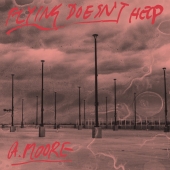
Moore Anthony
Flying Doesn't Help
Label: Drag City
Genre: 80s Wave / Rock / Pop / Punk
Availability
- LP €24.99 In Stock
40-plus years since its original release, the pop-punk-new wave inventions of Anthony Moore’s Flying Doesn’t Help are freshly remastered, blasting the sparkling, angular sounds into today with perfect vitality.
After spending the early years of the 70s making experimental music first as a solo artist, then with Slapp Happy and Henry Cow, 1976’s OUT sessions had reinvigorated Anthony’s youthful love of the naive pop melodies of pop radio, the undeniable excitement of songs. While OUT ultimately went unreleased at the time, the iconoclasm clouding the late ’70s air was addictive and transformative for Anthony. England seemed to be roiled as violently as it had been in counter-cultural days a decade earlier; the UK pop charts breathlessly reflected the changing spectrum with equal parts aging hippie and prog delicacies alongside new ascendant sounds: rough-hewn pub and punk rock, plus dub reggae and disco and ska and Stiff and Krautrock. . . . This proved to be an ideal environment for Anthony to make records by exploring, as he puts it, the “deep connection between minimalism, repetition, working with tape and celluloid and forming the modules of a three minute pop song.”
Caught up in a no-holds-barred era, Anthony was more than happy to play the out-of-his-head madman, raving through outrageous exchanges with the press, while “Judy Get Down” received Single of the Week honors from the NME (with review penned by Brian Eno). Represented by Blackhill Enterprises, Anthony did production work throughout ’78–’79, on Kevin Ayers’ Rainbow Takeaway, Manfred Mann’s Earth Band’s Angel Station and the first This Heat album, meanwhile cutting his own songs on a dead time deal at Workhouse Studio with engineer/producer Laurie Latham. Through the wee hours of countless nights, the two pieced together Flying Doesn’t Help, with a little help from friends (an inspired bunch, including Bob Shilling, Charles Hayward, Chris Slade, Robert Vogel, Festus, Matt Irving, Sam Harley, Bernie Clark, Edwin Cross and Martine Moore on the telephone!).
Building upon the axis of pop and experimental impulses that distinguished OUT, and informed further by the raw sensibilities exploding everywhere, Flying Doesn’t Help blasts out of the speakers with its own unique blend of sophistication and aggression, Anthony’s keyboard flashes between arpeggiantions and outright stabs among the noise of slicing guitars, funk basslines and the reverbed blare of the drumkit. Opening with Anthony’s greatest hit, “Judy Get Down,” and containing a noise-laden remake of the Slapp Happy/Henry Cow number, “War,” among other delightful sweet-and-salty confections, Flying Doesn’t Help never stops moving, fueled with raw outrage and dark satirical intent, churning with the energy of next-gen types like the Tubeway Army and DEVO, while shimmering with the elegance of the still-challenging old guard types, like Cale and Bowie.
Clearly, Flying Doesn’t Help was steeped in the time, and the original release reflected a deep mistrust of the corporation mindset. Information was a dubious concept, and connections to any recognizable organization were seen as untrustworthy, so facts like musician credits were left out of the package, and even Anthony’s name was altered (he was credited as A. More on the album and Tony More on a single release). The label name QUANGO was conceptual as well, standing for “Quasi Autonomous Non Governmental Organization”; each record was sealed with red tape that the listener was required to cut through in order to get to the music! Rather than recreate the conditions of the original release of Flying Doesn’t Help, this reissue instead embraces the changed environment of the current time and place: instead of no credits, now they are complete, with Anthony’s full name restored and even the artwork subtly “relocated” to reflect a new set of relationships. All of which brings the forward-looking sounds of Flying Doesn’t Help into the more independent-minded 21st century syntax where it belongs.
